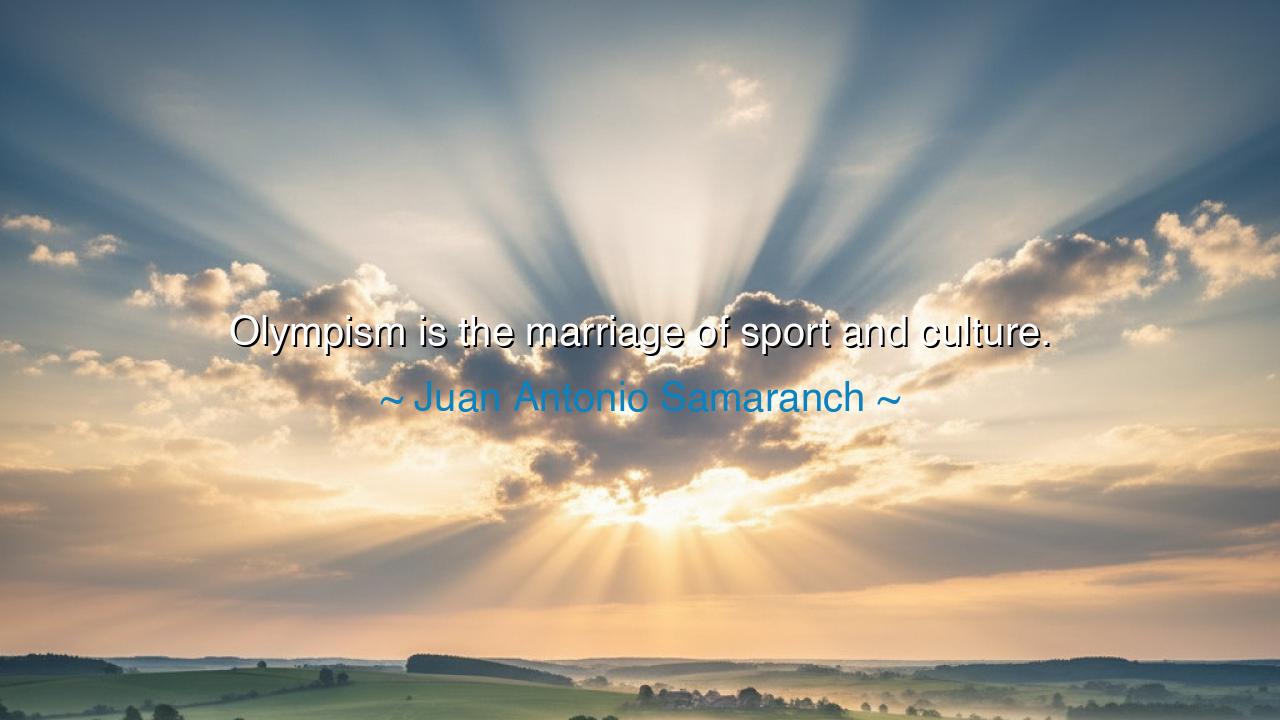
Olympism is the marriage of sport and culture.






When Juan Antonio Samaranch proclaimed, “Olympism is the marriage of sport and culture,” he spoke not merely of athletic games, but of the union of body and spirit, of discipline and art, of nations and their souls. His words echo across the centuries, to the very heart of the ancient Greek vision where the Olympic Games were not only contests of strength, but festivals of poetry, drama, sculpture, and philosophy. To him, the Olympic flame was not lit only on the track or in the stadium, but also in the hearts of people who expressed their greatness through thought, song, and beauty.
The meaning of this quote lies in the recognition that sport without culture is incomplete, and culture without sport is lacking. Sport awakens the body, teaching resilience, courage, and discipline. Culture awakens the spirit, teaching wisdom, compassion, and creativity. When the two are wedded, humanity is raised to its fullest expression—athletes are celebrated not only for their strength but for the spirit they embody, and nations are remembered not only for their victories but for their contributions to art, music, and learning. Thus, Samaranch calls us to remember that the Olympic ideal is not competition alone, but the celebration of humanity itself.
The origin of his thought is rooted in his stewardship as President of the International Olympic Committee, during which he sought to restore the Olympics to their original purpose. The ancient Greeks did not divide sport from culture: in Olympia, victories were crowned with poetry, and athletic triumphs inspired sculpture that still stands today. To resurrect this spirit, Samaranch urged that modern Olympism should not merely glorify medals, but should honor the shared culture of nations—where athletes carry not just flags but the living traditions of their peoples.
History gives us a vivid example in the 1936 Berlin Olympics. Though shadowed by the darkness of tyranny, the Games revealed this marriage of sport and culture. Jesse Owens, with his lightning speed, struck a blow not just for sport but for human dignity, defeating the false ideology of racial supremacy. His victory was not only a triumph of athleticism, but also a cultural moment that reshaped the world’s understanding of equality. In him, we see that Olympism is more than games—it is a stage where the moral and cultural spirit of humanity is tested alongside its physical strength.
The wisdom of Samaranch’s vision is that the Olympics are not only about records and scores, but about stories that endure in the memory of nations. A medal may tarnish, but the tale of an underdog’s courage, the music of the opening ceremony, the poetry of human endeavor—all these belong to the realm of culture and endure for generations. Sport teaches us how to strive; culture teaches us why we strive. Bound together, they remind humanity of its higher calling: not conquest, but unity, not destruction, but creation.
The lesson is clear: in our lives, we too must marry sport and culture. Strength alone without wisdom leads to brutality; wisdom without discipline fades into weakness. Just as the Olympian balances body and spirit, so must we balance our labor and our art, our striving and our reflection. To live fully is to train the body and feed the soul, to run the race and also to sing the song.
What then must the listener do? Practice discipline in your work as the athlete trains, but also nourish your mind with stories, music, and wisdom. Celebrate the victories of the body, but also the triumphs of compassion, justice, and creativity. And when you honor sport, remember also to honor the cultures from which each competitor comes, for each carries the spirit of a people.
Remember always: Olympism is the marriage of sport and culture. Let this be not only a principle of the Games, but a principle of life. For when body and spirit, strength and wisdom, discipline and beauty are joined, then humanity shines with its brightest light, and the flame of the Olympics becomes a flame within us all.






AAdministratorAdministrator
Welcome, honored guests. Please leave a comment, we will respond soon